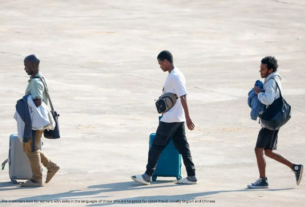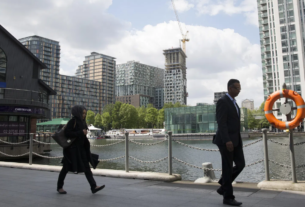Guinea’s ruling military leader, Mamady Doumbouya, has strengthened his hold on power while opposition groups remain silent. Political tensions have increased as critics fear retaliation, making open resistance difficult.
“We are all afraid,” a political activist said, describing the fear among opposition members. Many leaders have gone into hiding, while others avoid speaking out publicly.
Doumbouya took power in 2021 after overthrowing President Alpha Condé. His government has delayed elections and imposed strict measures against dissent.
The military has banned protests and arrested activists, limiting political freedoms. Many journalists face restrictions, making it difficult to report on opposition efforts.
The Economic Community of West African States (ECOWAS) has urged Guinea’s leaders to transition back to civilian rule. Despite international pressure, the military government has not set an election date.
Opposition leaders demand a clear timeline for elections but lack the power to challenge the junta. Many fear that speaking out could result in arrest or worse.
“This government rules through fear,” a human rights lawyer said, warning that Guinea risks becoming a long-term military dictatorship. He explained that political opposition is nearly impossible under current conditions.
The government justifies its actions by citing security concerns and the need for national stability. Officials claim that political instability could harm Guinea’s economy and increase violence.
Guinea has experienced several coups in its history, making political stability a major concern. The military argues that it must control the country to prevent further unrest.
Many citizens remain frustrated by the lack of progress toward democracy. Some fear that the military will hold onto power indefinitely.
The United States and European Union have condemned the crackdown on political freedoms. Sanctions have been imposed on key officials, but the government remains firm.
“Sanctions alone will not bring change,” a political analyst said, suggesting that stronger diplomatic measures are needed. He believes Guinea’s leaders will only respond to direct negotiations.
Guinea’s economy has also suffered under military rule, with inflation and unemployment rising. Many businesses struggle due to government instability and declining investor confidence.
You may wonder why the opposition is not taking stronger action. The reality is that military crackdowns have left little room for political resistance.
Protests have been met with violence, leading many to avoid public demonstrations. Security forces have used tear gas, arrests, and force to break up gatherings.
The military has also restricted internet access during key political moments. These blackouts prevent activists from organizing or sharing information.
Some opposition members have fled the country to avoid persecution. Others continue to speak out but risk imprisonment or harassment.
The crackdown has also affected civil society groups and independent media. Many organizations face legal threats or financial restrictions.
The military government insists that it will allow elections at the right time. However, no clear plan has been provided.
Activists argue that international intervention is needed to restore democracy. Without external pressure, Guinea’s political future remains uncertain.
The situation remains tense as citizens wait for change. Many hope that diplomatic efforts will lead to a peaceful transition.
For now, Doumbouya and his military remain in control. The opposition must find new strategies if it hopes to challenge the regime.




